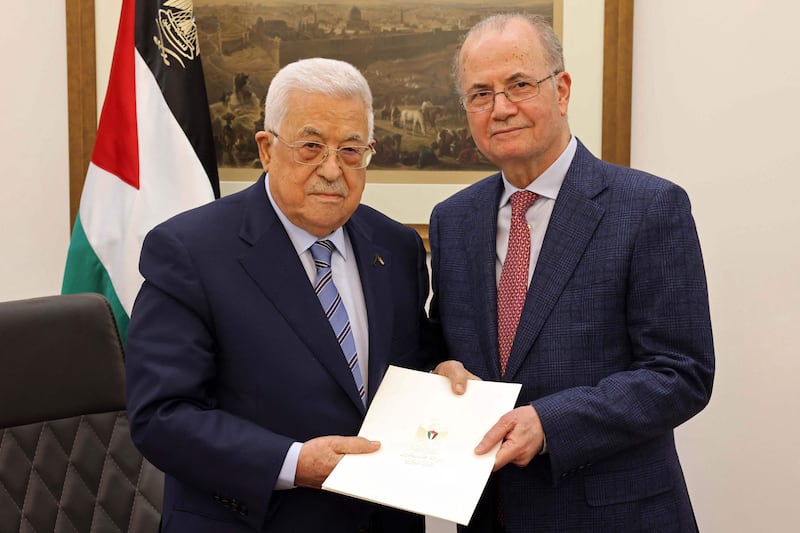Live updates: Follow the latest news on Israel-Gaza
Palestinian President Mahmoud Abbas has approved the formation of a new government headed by Prime Minister Mohammad Mustafa.
The new cabinet will be sworn in on Sunday, the official Wafa news agency reported, amid fears it will fail to root out corruption and provide accountability to the Palestinian people.
In January, US Secretary of State Antony Blinken cautioned that the Palestinian Authority “has a responsibility to reform itself, to improve its governance”, after meeting Mr Abbas on a regional tour.
Many observers had been hoping Mr Abbas would bring in new leaders to energise reform efforts, rather than veterans of the Palestinian Authority.
Amid the worst war in Gaza's history and the worst violence in the Israeli-occupied West Bank, observers are increasingly looking to the authority to have some role in a post-conflict Gaza.
Hamas has ruled Gaza since 2007, when it violently expelled the Palestinian Authority from the enclave, riding a wave of public discontent with the West Bank-based government. Mr Abbas's Fatah party had previously lost elections to Hamas in Gaza but had contested the results.
Mr Abbas, known widely as Abu Mazen, has been under pressure from the US and others to reform the Palestinian Authority, but has no experience in foreign policy.
Mr Mustafa will also serve as foreign minister, replacing Riyad Al Maliki.
Ziad Hab Al Rih will serve as interior minister, Omar Akram Al Bitar as finance minister, Sharhabeel Yousef Saad Eddin as justice minister and Majid Awni Mohamed as health minister.
On March 14, Mr Mustafa, seen by many as a technocrat who has long advised Mr Abbas on economic matters, was appointed the new Prime Minister of the Palestinian Authority, which governs the occupied West Bank.
The US welcomed the appointment and said it hoped a reform cabinet would be formed soon.
“A reformed Palestinian Authority is essential to delivering results for the Palestinian people and establishing the conditions for stability in both the West Bank and Gaza,” National Security Council spokeswoman Adrienne Watson said in a statement issued by the White House.
National Security Council spokesman John Kirby added: "We're going to take a look and we'll be looking to this new government to deliver on policies and to implement those credible and far-reaching reforms." He also said it was "too soon" to make any "broad judgements" about the government.
The US State Department spokesman Matthew Miller said that Washington has "always believed that the PA needed to be a government that was fully representative of the Palestinian people".
"Now we will look to them to implement policies that follow up on reform and deliver on the demands ... from the Palestinian people."
The Palestinian Authority has long battled accusations of corruption and mismanagement.

Mr Mustafa, who was born in 1954 in the village of Saffarin, near Tulkarm in the occupied West Bank, has led the Palestine Investment Fund since 2009. It was established by the Palestinian Authority in 2003 to promote the growth of infrastructure, real estate and telecoms in the Palestinian territories.
He founded the Palestine Telecommunications Company (PalTel), alongside other businesses including Wataniya Mobile/Ooredoo Palestine, following his education in Iraq and the US.
He was deputy prime minister from 2013 to 2014 and is an independent member of the Palestine Liberation Organisation's Executive Committee.
However, Mr Mustafa is seen as having no close links to the main political factions in Palestinian politics: Fatah, the most important party in the PLO, or its rival Hamas, which is now the target of Israel's war on Gaza.
On Thursday Mr Mustafa said that Israel's war, which has claimed more than 32,000 lives, was “barbaric”.
“I would like to begin my speech by offering my condolences to the martyrs of our people, bowing in reverence to their sacrifices, and wishing a speedy recovery for the wounded, and freedom for our heroic prisoners and their patient families, for the bleeding wound in the beloved Gaza Strip, and for our people who are steadfast in the face of the occupation’s aggression and the terrorism of its settlers, in the camps, villages and cities,” he said.
Occupation, war and economic crisis
The new prime minister's rise to power has seen a steadily worsening situation in both Gaza and the West Bank, amid rapid Israeli settlement construction which has jumped sharply under the latest government of Israeli Prime Minister Benjamin Netanyahu, Israel’s most right wing to date.
In addition to near-constant Israeli raids in West Bank towns such as Jenin and Nablus, the conflict has had a devastating impact on the area's economy, amid widespread Israeli checkpoints and almost siege-like conditions in some communities.

“About 200,000 workers lost their jobs in Israel, and the work and productivity of about 85 per cent of economic and commercial establishments declined.
“Private sector losses in the first four months of the war in the West Bank and Gaza amounted to about $2.3 billion at a rate of $19 million per day,” Mr Mustafa said.
“The government’s debt from banks exceeded $2 billion, in addition to late obligations to the Palestinian Retirement Authority. It amounts to about $3 billion.
“That is, the government's general obligations and debts amounted to about $7 billion.”
Many Palestinians in the West Bank say their government could have done more to improve their situation, despite occupation.
It has little popular support or legitimacy among Palestinians, in part because it has not held elections in 18 years.
Its policy of co-operating with Israel on security matters is extremely unpopular and has led many Palestinians to view it as a subcontractor of the occupation.
Opinion polls in recent years have consistently found that a vast majority of Palestinians want 88-year-old Mr Abbas to resign.






